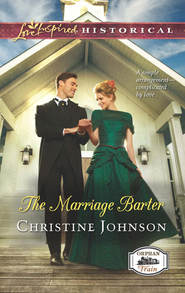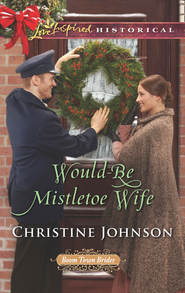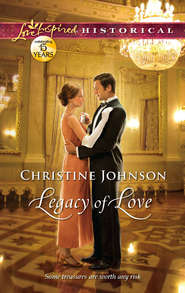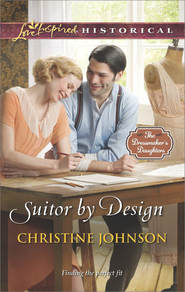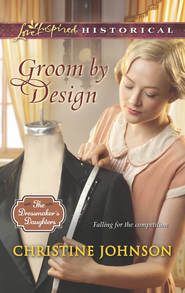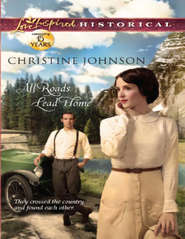По всем вопросам обращайтесь на: info@litportal.ru
(©) 2003-2024.
✖
The Matrimony Plan
Настройки чтения
Размер шрифта
Высота строк
Поля
Prayer hadn’t brought sleep or a calm stomach, so first thing in the morning he headed to the drugstore for medicine. Before he’d walked a block, the one Ladies’ Aid Society member who hadn’t asked for a favor stopped him. Short and plump, Mrs. Simmons epitomized the loving mother. Her round cheeks glowed, and her blue eyes twinkled merrily.
“Pastor Meeks. How good to see you.”
Gabriel greeted her and smiled at her gawky teenage daughter, who hung back holding a basket covered in cheap gingham. He wished he could remember the girl’s name.
“Anna and I were just on our way to the parsonage with some cinnamon rolls.”
Anna. That was it. The delicious aroma of fresh bread and cinnamon revived his downtrodden spirit. “For me?”
Mrs. Simmons smiled broadly, her rosy cheeks round as apples. “You’re looking mighty thin.” She clucked her tongue softly. “No housekeeper or wife to keep meat on those bones. If you’re hiring, my Anna’s a hard worker.”
The girl kept her face averted, but Gabriel saw her blush.
“I’ll keep that in mind,” he said, “after my sister visits.”
If he wasn’t fired first.
“Oh my, you have a sister. Is she younger than you?”
Mrs. Simmons had such a kindly manner that Gabriel easily confided in her. After a few minutes talking about his older sister, Gabriel saw Blake Kensington drive by. Though the son had proven companionable, any Kensington reminded him that his fate still hung in the balance. The bile rose in his throat.
“Please excuse me.” He hated cutting off a parishioner, but he couldn’t concentrate on what she was saying when his gut hurt. “Can you tell me where I might buy something for a stomachache?”
“Mercy me, here I am prattling away when you need medicine. The drugstore’s across the street at the end of this block. You hurry on now, and I’ll leave the rolls on your porch.”
Though Gabriel insisted he could carry them, she would have none of it. “I’ll send Anna.” And before he could protest further, the girl sped off.
Mrs. Simmons then motioned him close and whispered, “Be sure to use the front entrance.”
“Why wouldn’t I?” he asked, puzzled, but she only bid him goodbye and headed for the post office.
What an odd thing to say. Customers never used the back door of a business. That was for deliveries and employees. He stopped outside the drugstore and examined the storefront. It looked like any drugstore with advertisements for tonic and perfume and lotions in the front windows. The interior was lined to the ceiling with narrow shelves and bottles. A long wooden counter, manned by an attractive, dark-haired woman of perhaps forty, kept customers from the strongest drugs.
He stepped to the counter. “I’d like something for stomach upset.”
The woman smiled pleasantly between the curled ends of her bobbed hair. “You’re the new minister in town, aren’t you?”
“Yes, I am. Reverend Meeks.”
“I’m Mrs. Lawrence. Would you prefer dyspepsia tablets or bicarbonate of soda?”
“The tablets, please, a half dozen.” If he didn’t butt heads with Kensington too often, he wouldn’t need more.
She slid the tablets into a tiny paper envelope. “That will be twenty cents.”
As he handed over the dimes, he heard two young ladies whisper behind gloved hands. He recognized them from the Ladies’ Aid Society meeting. One had been pushed by her mother to meet him, if he recalled correctly. Unfortunately, he couldn’t remember their names, a poor start for their pastor.
“May I help you, Eloise?” Mrs. Lawrence asked pointedly.
Eloise Grattan. That was it. And the one with the pointed nose must be Sally something-or-other.
“No, not today,” Ms. Grattan giggled, darting a glance his way.
Her mother had brazenly offered her daughter as a potential wife. Though Gabriel had come to town hoping to find a bride, he didn’t want one thrust on him.
“Ladies.” He nodded, eliciting yet another round of giggles.
The bell above the door tinkled when he left, replacing his irritation with a warm homey feeling. This was small-town America, the rural ideal he’d envisioned—girls giggled, boys played, clean air, bright storefronts and friendly townspeople—well, at least for the most part.
He waited at the corner for a motorcar to pass. The Packard approached quickly, and the driver blew the horn to warn everyone to scatter. For a second, the significance didn’t hit Gabriel. Then he remembered. This was Kensington’s car. Gabriel watched it turn into the alley behind the drugstore. What had Mrs. Simmons said? To be certain to use the front door?
Curious, he hurried down the street and reached the alley just as the motorcar was driving away. The heel of a man’s shoe vanished into the drugstore’s back door—Kensington, no doubt. Gabriel strode down the alley and tried the door. Locked. Whatever was going on, it wasn’t good.
Evil hides from the light.
What this town needed was someone to shine a bright light into the dark corners. They needed their eyes opened to the corruption around them. The people of this town needed a leader who would stand up to Kensington, not another puppet giving bland sermons and lukewarm advice. This town needed its spiritual and social fire relit. God had called him, Gabriel Meeks, to Pearlman for a reason. He now knew what that reason was.
Reinvigorated, Gabriel strode past the church to the park.
This whole business began in the woods behind the parsonage. Criminals, Coughlin had said. Gabriel now knew what the man meant. Something was going on near that broken-down fence, and he intended to find out what.
The route to Baker’s Field took Felicity past the park and the parsonage with its hedge of furiously blooming bridal’s veil. If she could get to the barn first, she could ask for Robert’s assistance before Sally and Eloise claimed his time.
She hurried past the cramped fields of Einer Coughlin, the last farmhouse before Baker’s Field. Though she couldn’t spot Robert in the field, a motorcar was parked near the barn. It looked like Blake’s, meaning Robert had to be there.
If she cut across Coughlin’s hayfield, she’d save precious minutes, but the man was the meanest farmer in town. Everyone blamed it on his wife’s untimely death and son’s running away, but Felicity sympathized with the wife and son. He’d likely driven them to their rash actions. Shiftless and stingy, Mr. Coughlin grew hay on the richest farmland in the township.
She hated walking by Coughlin’s land. Sometimes he’d yell at passersby. Occasionally he’d threaten them. She hurried past the ramshackle house surrounded by garbage and broken equipment. It was an eyesore and a disgrace and so close to the parsonage, too. Poor Gabriel.
Poor Gabriel? What was she thinking? She had set her cap on Robert Blevins, not Gabriel Meeks.
With a shudder, she scurried by the Coughlin place, head down. Just a few yards more, she thought. Then a pitiful whining made her stop. That came from a dog, and judging by its plaintive cry, it was hurt. Was the animal caught in one of the rusting buggies or plows near the house? If so, Coughlin would shoot it out of spite.
A horrible yelp set her in motion. She had to save the poor thing before it was too late, but where was it? At first, the cries seemed to come from near the house, but as she went farther into the newly reaped field, she realized the animal was behind the house, toward the river.
When she rounded the decaying wagon, she saw. Mr. Coughlin, rifle slung over his shoulder, dragging poor Slinky toward the river on a rope.
“Stop,” she cried, racing toward them.
The dog struggled against the rope with all his might, but Mr. Coughlin didn’t let go. With a jerk, the knot tightened around Slinky’s neck.
“Stop. You’ll strangle him.”
Coughlin kept walking.
The wet earth sucked the ivory satin pumps off her feet. She yanked the shoes out of the mud and tried again, but two steps later, the shoes came off again. It was no use. She grabbed the shoes and ran in her stocking feet. The hay stubble stabbed her soles, but she had to save Slinky.
“Stop. Stop.” She waved the shoes, but Coughlin didn’t hear her.






